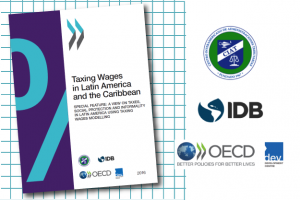CIAT, IDB, OECD – Latin America and the Caribbean: Low personal income taxes lead to lower taxes on wages compared with OECD

Buenos Aires, 26 September 2016 – Taxes on the labour income of the average worker in Latin American and Caribbean (LAC) countries totalled 21.7% of total labour costs in 2013, one-third lower than in OECD countries, where the average was 35.9%, according to the first edition of Taxing Wages in Latin America and the Caribbean. More than 90% of the difference between LAC and OECD is due to personal income tax (13% of total labour costs).
The new report, covering 20 LAC countries, was produced jointly by the Inter-American Centre of Tax Administrations (CIAT), the Inter-American Development Bank (IDB), the Development Centre and the Centre for Tax and Policy Administration both of the Organisation for Economic Co-operation and Development (OECD). The report was launched today in Buenos Aires during the VI LAC Fiscal Policy Forum hosted by Argentina’s Ministry of Treasury and Public Finances.
The relatively low level of the LAC tax wedge – which measures the difference between an employer’s labour costs and an employee’s corresponding net take-home pay – reflects very low average personal income tax (PIT) rates. In fact, Mexico was the only country included in the report where workers had to pay PIT at the average wage level. In comparison, PIT represented 13.3% of the labour costs of an average worker in OECD countries. In the LAC region, the vast majority of the working population have incomes below the minimum PIT thresholds due to generous specific allowances. The prevalence of informal labour markets and tax evasion also contribute to the low levels of PIT revenues.
The tax wedge for the average one-earner married couple with two children in LAC countries was 21.4%, only 0.3 percentage points less than that of the single worker, according to the report. The corresponding difference in OECD countries, where working family benefits are substantially higher, was 9.5 percentage points. Family allowance schemes exist in only five of the 20 LAC countries – Argentina, Brazil, Chile, Colombia and Uruguay – and are unavailable at the average wage level in Chile.
A special chapter of the report explores the relationships between taxes on wages, characteristics of labour markets and levels of labour informality in LAC countries. The interaction between lower earnings thresholds of social security contributions (SSCs) -generally at the minimum wage level- and social security programme contribution rates increases the costs of adhering to social programmes for those with earnings in the lower and middle-income deciles. Meanwhile, the cost of formal labour market participation, as a percentage of earnings, decreases for those in the upper half of the earnings distribution with earnings above the minimum thresholds.
The analysis shows that high rates of informality are correlated with high formalisation costs, especially for those at the lower-end and in the low-middle range of the income distribution. This adds to the many other non-tax factors that explain the decisions of individuals in the LAC region to either join or remain in the informal labour market.
Key findings:
- The tax wedge across LAC countries varies widely, from 34.6% in Argentina and 32.2% in Brazil to 11% in Trinidad and Tobago and 10% in Honduras. Colombia and Uruguay also have levels above 30%, while Guatemala’s tax wedge is also less than 15%.
- Chile (19.1% of gross wage earnings) had the highest personal average tax rate (defined as PIT plus mandatory employee SSCs) in the region followed by Uruguay (18.0%) and Argentina (17.0%). The lowest rates were in Honduras (3.6%), Guatemala (4.0%) and Trinidad and Tobago (4.5%). The average amongst the LAC countries was 9.3% compared with the OECD average of 25.4%.
- For the single worker without children, LAC tax systems start to exhibit slight progressivity around the eighth income decile as workers in some countries start to pay PIT. On the other hand, for a one-earner married couple with two children, the average tax system is slightly progressive at lower levels of income. It then becomes proportional in the middle-income deciles before matching the single worker without children at the upper deciles of the income distribution.
Requests to receive a copy of Taxing Wages in Latin America and the Caribbean by e-mail should be sent to Bochra.Kriout@oecd.org.
Further information is available at: www.oecd.org/dev/taxing-wages-in-latin-america-and-the-caribbean-2016-9789264262607-en.htm
Press Contacts:
- Inter-American Centre of Tax Administrations (CIAT): Neila Jaén, njaen@ciat.org, T: + 507 3072428
- Inter-American Development Bank (IDB): Mildred Rivera, mildredr@iadb.org, T: +1 202 6232319
- OECD Centre for Tax Policy and Administration: Maurice Nettley, Maurice.Nettley@oecd.org, T. +33 145 24 96 17
- OECD Development Centre: Bochra.Kriout@oecd.org, T:+33 145 24 82 96
